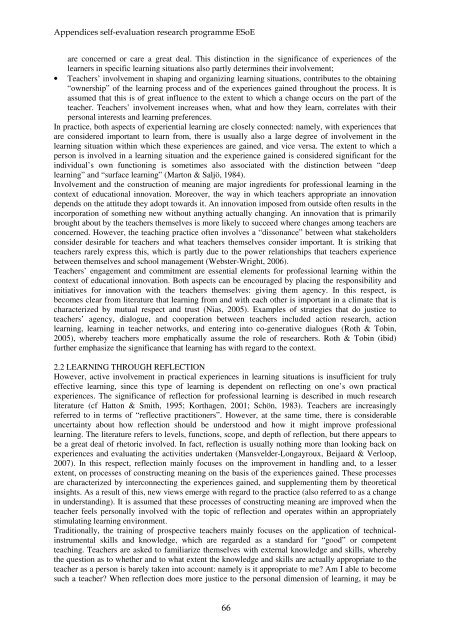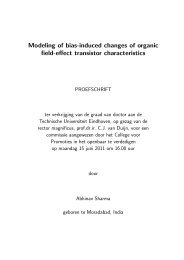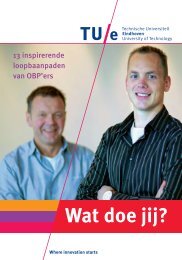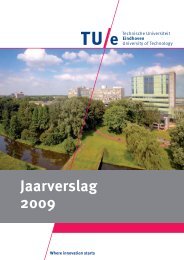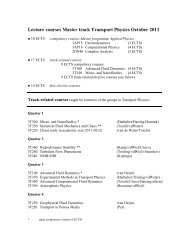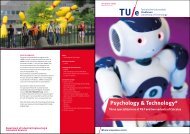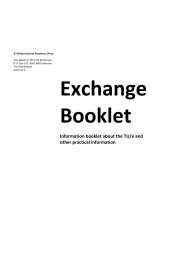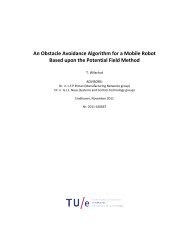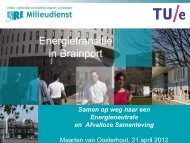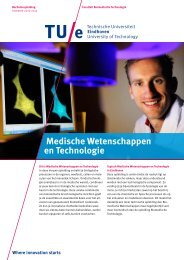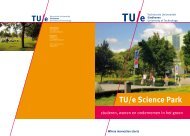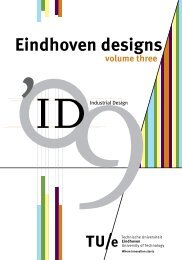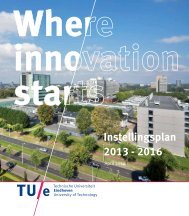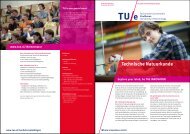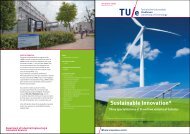Self-evaluation - Technische Universiteit Eindhoven
Self-evaluation - Technische Universiteit Eindhoven
Self-evaluation - Technische Universiteit Eindhoven
You also want an ePaper? Increase the reach of your titles
YUMPU automatically turns print PDFs into web optimized ePapers that Google loves.
Appendices self-<strong>evaluation</strong> research programme ESoE<br />
are concerned or care a great deal. This distinction in the significance of experiences of the<br />
learners in specific learning situations also partly determines their involvement;<br />
• Teachers’ involvement in shaping and organizing learning situations, contributes to the obtaining<br />
“ownership” of the learning process and of the experiences gained throughout the process. It is<br />
assumed that this is of great influence to the extent to which a change occurs on the part of the<br />
teacher. Teachers’ involvement increases when, what and how they learn, correlates with their<br />
personal interests and learning preferences.<br />
In practice, both aspects of experiential learning are closely connected: namely, with experiences that<br />
are considered important to learn from, there is usually also a large degree of involvement in the<br />
learning situation within which these experiences are gained, and vice versa. The extent to which a<br />
person is involved in a learning situation and the experience gained is considered significant for the<br />
individual’s own functioning is sometimes also associated with the distinction between “deep<br />
learning” and “surface learning” (Marton & Saljö, 1984).<br />
Involvement and the construction of meaning are major ingredients for professional learning in the<br />
context of educational innovation. Moreover, the way in which teachers appropriate an innovation<br />
depends on the attitude they adopt towards it. An innovation imposed from outside often results in the<br />
incorporation of something new without anything actually changing. An innovation that is primarily<br />
brought about by the teachers themselves is more likely to succeed where changes among teachers are<br />
concerned. However, the teaching practice often involves a “dissonance” between what stakeholders<br />
consider desirable for teachers and what teachers themselves consider important. It is striking that<br />
teachers rarely express this, which is partly due to the power relationships that teachers experience<br />
between themselves and school management (Webster-Wright, 2006).<br />
Teachers’ engagement and commitment are essential elements for professional learning within the<br />
context of educational innovation. Both aspects can be encouraged by placing the responsibility and<br />
initiatives for innovation with the teachers themselves: giving them agency. In this respect, is<br />
becomes clear from literature that learning from and with each other is important in a climate that is<br />
characterized by mutual respect and trust (Nias, 2005). Examples of strategies that do justice to<br />
teachers’ agency, dialogue, and cooperation between teachers included action research, action<br />
learning, learning in teacher networks, and entering into co-generative dialogues (Roth & Tobin,<br />
2005), whereby teachers more emphatically assume the role of researchers. Roth & Tobin (ibid)<br />
further emphasize the significance that learning has with regard to the context.<br />
2.2 LEARNING THROUGH REFLECTION<br />
However, active involvement in practical experiences in learning situations is insufficient for truly<br />
effective learning, since this type of learning is dependent on reflecting on one’s own practical<br />
experiences. The significance of reflection for professional learning is described in much research<br />
literature (cf Hatton & Smith, 1995; Korthagen, 2001; Schön, 1983). Teachers are increasingly<br />
referred to in terms of “reflective practitioners”. However, at the same time, there is considerable<br />
uncertainty about how reflection should be understood and how it might improve professional<br />
learning. The literature refers to levels, functions, scope, and depth of reflection, but there appears to<br />
be a great deal of rhetoric involved. In fact, reflection is usually nothing more than looking back on<br />
experiences and evaluating the activities undertaken (Mansvelder-Longayroux, Beijaard & Verloop,<br />
2007). In this respect, reflection mainly focuses on the improvement in handling and, to a lesser<br />
extent, on processes of constructing meaning on the basis of the experiences gained. These processes<br />
are characterized by interconnecting the experiences gained, and supplementing them by theoretical<br />
insights. As a result of this, new views emerge with regard to the practice (also referred to as a change<br />
in understanding). It is assumed that these processes of constructing meaning are improved when the<br />
teacher feels personally involved with the topic of reflection and operates within an appropriately<br />
stimulating learning environment.<br />
Traditionally, the training of prospective teachers mainly focuses on the application of technicalinstrumental<br />
skills and knowledge, which are regarded as a standard for “good” or competent<br />
teaching. Teachers are asked to familiarize themselves with external knowledge and skills, whereby<br />
the question as to whether and to what extent the knowledge and skills are actually appropriate to the<br />
teacher as a person is barely taken into account: namely is it appropriate to me? Am I able to become<br />
such a teacher? When reflection does more justice to the personal dimension of learning, it may be<br />
66


